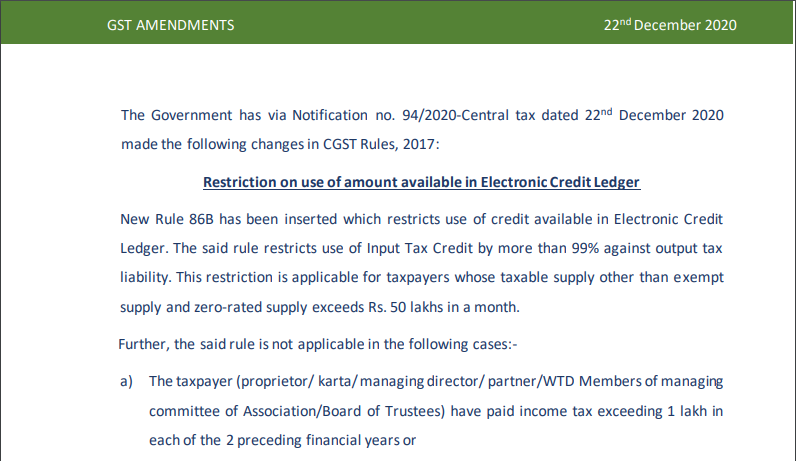GST Amendments Notified on 22.12.2020
Table of Contents
- GST Amendments Notified on 22.12.2020
- Restriction on use of amount available in Electronic Credit Ledger
- Further, restriction in availment of Input Tax Credit under Rule 36(4)
- Changes in GST Registration Procedure
- Deemed Approval –
- Cancellation of GST Registration
- Restriction in filing of GST returns
- E-way Bill
- Restriction on generation of E-way bill
- Provisions notified through Finance Act 2020
- Disclaimer:
GST Amendments Notified on 22.12.2020
The Government has via Notification no. 94/2020-Central tax dated 22nd December 2020 made the following changes in CGST Rules, 2017:
Restriction on use of amount available in Electronic Credit Ledger
New Rule 86B has been inserted which restricts the use of credit available in Electronic Credit Ledger. The said rule restricts the use of Input Tax Credit by more than 99% against output tax liability. This restriction is applicable for taxpayers whose taxable supply other than exempt supply and zero-rated supply exceeds Rs. 50 lakhs in a month.
Further, the said rule is not applicable in the following cases:-
a) The taxpayer (proprietor/ Karta/ managing director/ partner/WTD Members of the managing committee of Association/Board of Trustees) have paid income tax exceeding 1 lakh in each of the 2 preceding financial years or
b) Where taxpayers have received a refund of unutilized input tax credit exceeding 1 lakh in the preceding financial year on account of exports or supplies to SEZ or
c) Where taxpayers have received a refund of unutilized input tax credit exceeding 1 lakh in the preceding financial year on account of inverted duty structure or
d) The taxpayer has discharged his liability towards output tax through the Electronic Cash Ledger for an amount which is more than 1% of the total output liability, applied cumulatively, up to the said month in the current financial year or
e) The taxpayer is
-Government Department
-Public Sector Undertaking
-Local authority
-Statutory body
The Commissioner or any officer authorized by him on this behalf may remove the said restriction after such verification and safeguards as he may deem fit.
(effective from 1st January 2021)
Further, restriction in availment of Input Tax Credit under Rule 36(4)
Input tax credit to be availed by a registered person in respect of invoice or debit notes, the details of which have not been furnished in FORM GSTR-1 or using the invoice furnishing facility shall not exceed 5 percent of the eligible credit available in respect of invoices or debit notes the details of which have been furnished in FORM GSTR-1 or using the invoice furnishing facility. Earlier, this limit was 10%.
Related Topic:
Important changes as per Notification No. 94/2020-CT dated 22-12-2020 Applicable from 1 January 2021
(effective from 1st January 2021)
Changes in GST Registration Procedure
Increase in time with respect to granting of GST Registration- Where a person applies for GST registration, the proper officer shall have 7 days’ time to either grant the registration in FORM GST REG-06 or issue a deficiency notice in FORM GST REG-03. Earlier this time limit was 3 days.
Biometric authentication for grant of GST registration– The authentication is done until now while applying for GST registration was based on Aadhar number authentication. However, now the Individual/ Karta/Managing Director/WTD/Partner/Members of the managing committee of Association/Board of Trustees, Authorized Representatives or Authorized Signatory will have to get biometric-based Aadhar authentication and photographs submitted.
In case a person wishes not to opt for Aadhar authentication, biometric information along with photographs and other KYC documents are to be submitted. Only upon verification of such documents, the registration would be granted.
These activities would have to be physically carried out at one of the Facilitation centers as notified by the Commissioner.
(effective date to be notified)
Physical verification for grant of GST Registration- Where a person has not opted for Aadhar authentication or fails to undergo Aadhar authentication or where the proper officer deems it fit there shall be physical verification of the place of business of the person applying for GST registration. In such a case where physical verification has been carried out, one of the following steps will be carried out:
a) registration shall be granted in FORM GST REG-06 (where documents are in order) or
b) deficiency memo shall be issued (where further documents or clarifications are required) in FORM GST REG-03
Either one of the above activities needs to be carried out within 30 days of the submission of the application.
Deemed Approval –
a) If no physical verification was carried out:- In such a case if registration is not granted within 7 days of receipt of application which is complete in all aspects or within 7 days of receipt of clarification to FORM GST REG-03 in FORM GST REG-04, the application for registration shall be deemed to have been approved.
b) Where physical verification was carried out:- In such a case if registration is not granted or a deficiency memo is not issued within 30 days of receipt of the application, the application for registration shall be deemed to have been approved.
Cancellation of GST Registration
No opportunity of being heard – Where the proper officer has reasons to believe that the registration of a person is liable to be cancelled, he may without affording the said person a reasonable opportunity of being heard, suspend the registration of such person with effect from a date to be determined by him.
Increase in reasons for cancellation of registration – Apart from the existing reasons, the government has allowed cancellation of registration in the following cases:
a) If a registered person avails input tax credit in violation of the provisions of section 16 of the Act or rules made thereunder or
b) If a registered person furnishes details of outward supplies in FORM GSTR-1 for one or more tax periods in excess of outward supplies declared in GSTR-3B c) If a registered person violates provisions of newly inserted rule 86B (discussed above)
Suspension of Registration in special cases – Registration of a taxpayer can be suspended in the following cases:
a) where there is a significant difference or anomaly between outward supplies in GSTR 1 and GSTR 3B
b) where there is a significant difference or anomaly between GSTR2A and GSTR 3B This should result in any contraventions to the provisions of the Act or the rules thereunder. Further to such suspension, an intimation shall be send to the taxpayer in his e-mail ID requiring him to explain within 30 days as to why his registration shall not be cancelled.
Restrictions in case of Suspension of GST registration- A registered person whose registration has been cancelled can neither make any taxable supplies nor shall be granted refund.
Removal of suspension before completion of proceeding- The proper officer shall now have the option to revoke the suspension of registration anytime during the pendency of proceedings for cancellation.
Restriction in filing of GST returns
a) For monthly filers- Such registered person shall not be allowed to file GSTR 1 in case he has not furnished his return in FORM GSTR 3B for the preceding two months.
b) For quarterly filers- Such registered person shall not be allowed to file GSTR-1 or use invoice furnishing facility in case he has not furnished return in FORM GSTR 3B for preceding tax period.
c) For monthly filers on whom there is a restriction on utilization of ITC- Such registered persons shall not be allowed to file GSTR-1 or use invoice furnishing facility in case he has not furnished return in FORM GSTR 3B for preceding tax period.
E-way Bill
Validity of E-way bill- Earlier the validity of the e-waybill was 1 day for each 100 Km. Now this limit has been changed to 200 Km. This effectively means that e-waybill would expire faster than the time prescribed earlier.
Restriction on generation of E-way bill
Where the GST registration of a taxable person has been suspended neither the taxpayer/recipient nor the transporter will be able to generate E-way bill
Provisions notified through Finance Act 2020
Various provisions of the Finance Act 2020 have been notified to be effective from 1st January 2021 which are as follows:
a. Time limit for taking ITC for debit notes have been provided upto September return of next financial year if the debit note pertains to the current financial year. Earlier the date of original invoice corresponding to such debit note was the relevant document based on which the time limitation for availing ITC had to be calculated.
b. Composition taxable person for services have been barred from making supplies not leviable to tax, making interstate supply of services and supplies through E-commerce operator required to collect TCS
c. The provisions of late fees for late issuance of TDS certificates have been dropped.
d. Effective from 1st January 2021, a person opting for voluntary registration can also opt for cancellation of registration if he longer requires the registration. He was barred from doing so earlier.
e. The period of revocation of cancellation of registration can be extended by further 30 days if allowed by the Additional Commissioner or Joint Commissioner. Also, the Commissioner has been empowered to grant a further extension of 30 days beyond the period allowed by the Joint/Additional Commissioner.
f. Apart from the taxpayers involved in fake invoicing, even the beneficiaries of such fake invoicing have been made liable to penalty.
g. Availment of input tax credit on the basis of invoice not accompanied by supply or without invoice has been declared one of the offences u/s 132 for prosecution.
h. In certain supplies as may be notified, requirement to issue tax invoice may be done away with.
i. In Schedule II for classification between the supply of goods and services, the portion which allowed the transfer of business assets ‘even without consideration’ to be a supply has been omitted. This is because without availing input tax credit, the transfer of business assets cannot be classified as a supply under Schedule I.
Disclaimer:
This publication contains information for general guidance only. It is not intended to address the circumstances of any particular individual or entity. Although the best of endeavor has been made to provide the provisions in a simpler and accurate form, there is no substitute for detailed research with regard to the specific situation of a particular individual or entity. S. Khaitan & Associates or any of its officials do not accept any responsibility for loss incurred by any person for acting or refraining to act as a result of any matter in this publication.
 Shubham Khaitan
Shubham Khaitan
Kolkata, India









